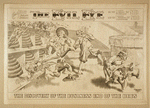The immense accretion of flesh which had descended on her in middle life like a flood of lava on a doomed city had changed her from a plump active little woman with a neatly-turned foot and ankle into something as vast and august as a natural phenomenon. She had accepted this submergence as philosophically as all her other trails, and now, in extreme old age, was rewarded by presenting to her mirror an almost unwrinkled expanse of firm pink and white flesh, in the centre of which the traces of a small face survived as if awaiting excavation. A flight of smooth double chins led down to the dizzy depths of a still-snowy bosom veiled in snowy muslins that were held in place by a miniature portrait of the late Mr. Mingott and around and below , wave after wave of black silk surged away over the edges of a capacious armchair, with two tiny white hands poised like gulls on the surface of the billows .
---Edith Wharton, The Age of Innocence (1920)





